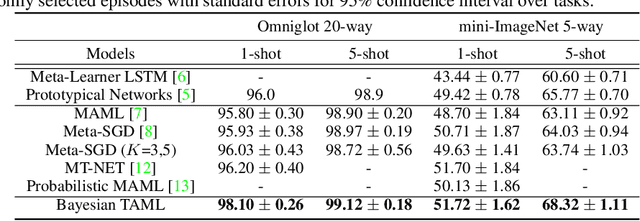Learning to Balance: Bayesian Meta-Learning for Imbalanced and Out-of-distribution Tasks
Paper and Code
May 30, 2019



While tasks could come with varying number of instances in realistic settings, the existing meta-learning approaches for few-shot classfication assume even task distributions where the number of instances for each task and class are fixed. Due to such restriction, they learn to equally utilize the meta-knowledge across all the tasks, even when the number of instances per task and class largely varies. Moreover, they do not consider distributional difference in unseen tasks at the meta-test time, on which the meta-knowledge may have varying degree of usefulness depending on the task relatedness. To overcome these limitations, we propose a novel meta-learning model that adaptively balances the effect of the meta-learning and task-specific learning, and also class-specific learning within each task. Through the learning of the balancing variables, we can decide whether to obtain a solution close to the initial parameter or far from it. We formulate this objective into a Bayesian inference framework and solve it using variational inference. Our Bayesian Task-Adaptive Meta-Learning (Bayesian-TAML) significantly outperforms existing meta-learning approaches on benchmark datasets for both few-shot and realistic class- and task-imbalanced datasets, with especially higher gains on the latter.
 Add to Chrome
Add to Chrome Add to Firefox
Add to Firefox Add to Edge
Add to Edge